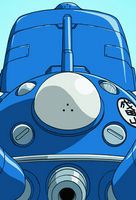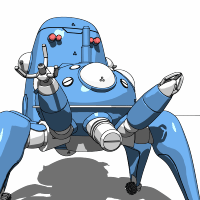October 16, 2007
From the New york Times of all places: China opens 17th Party Congress.
President Hu Jintao promised to address social fissures, a degraded environment and rampant corruption during his second term as China’s top leader, but he all but ruled out more than cosmetic political reform in his opening address on Monday at the 17th National Congress of the governing Communist Party.
Mr. Hu spoke extensively about his “scientific view of development,†a set of lofty, vague principles supporting harmonious economic, social and political development.The congress will enshrine the phrase “scientific view of development†into the party’s constitution alongside the political slogans of Mao, Deng Xiaoping and Jiang Zemin, elevating Mr. Hu into the pantheon of leaders as he begins his second and final term as party general secretary, head of state and military chief.
The Chinese won't cahnge because the people at the top benefit from keeping the sytem as it currently is. And to do so would be to admit that all of China's problems are in fact of the state's and therefore, Party's making. Here is a fine example of that, form the Tai Pei Times: Millions more relocated for PRC's Three Gorges Dam.
Four million more people are to be relocated away from China's Three Gorges Dam area, state media reported yesterday, weeks after officials warned of a potential "environmental catastrophe" there.Already 1.4 million people have been forced to leave their homes to make way for the world's largest hydropower project, which started operations last year, but the new announcement has radically expanded the resettlement project.
The 4 million residents who will be "encouraged" to leave their homes live near the dam's reservoir, which extends for 600km, the China Daily reported, citing local officials.
So many people saw this coming, and gave repeated and vocal warnings makes this all the more tragic for the simple peasants who are being forced from their homes. Hubris drove this project, and now it is rearing its ugly head and turning on its creators. The Chinese are having to spend more and more of their time holding their fragile and restive nation together as these two pieces from the City Journal demonstrate.
Welcome to the People’s Republic, land of “harmony†and “community.â€First: “harmony.†For the Chinese government, it means “suppression of individualism.†Errant thoughts threaten central control of the masses. Dissent is bad and punishable. John Stuart Mill correctly wondered whether, under an autocratic regime, “there would be any asylum left for individuality of character; whether public opinion would not be a tyrannical yoke; whether the absolute dependence of each on all, and the surveillance of each by all, would not grind all down into a tame uniformity of thoughts, feelings, and actions.†In China, the reigning belief is that nonconforming ideas will fracture the enforced consensus and produce factionalism. There seems to be no James Madison in power who can raise his head and point out that having numerous factions enables governance of a large country.
Chinese leaders fear the huge and growing gaps between urban and rural, rich and poor, coastal and interior residents, and those with and without “guanxi†(connections). Inharmoniousness is rife. Preaching harmony is a desperate measure, and it is not enough. The hopeful view: this is stop-gap rhetoric while national policy shifts from economic development to the more intractable issue of societal development in an authoritarian state. But the hopeful view may not reflect reality.
The desperation of the Chinese is beginning to become apparent, despite their best efforts the lid is nearly constantly threating to come off. For now the pot simmers, but the risk of a massive boil over is always right there.
But the “community†is not quite what it seems. All residents in the harmonious community are equal, but some are (much) more equal than others—in Orwell’s trenchant phrase. Three distinct populations exist in a community—residents, visitors, and migrants—and they have very different rights. China has some 200 million migrants, well more than 10 percent of the workforce, and they constitute up to 28 percent of a city’s population. Migrant workers are akin to illegal aliens in the United States. Their labor helps staff the factories, but their families, who would strain the capacities of community services, are unwelcome. Therefore migrants aren’t officially members of the “communities†where they live. This may help explain why officials assert that the community, not the family, is the “basic unit of society.†If the families of migrants are excluded, how could the family possibly be that basic unit?
The only real change to China will come only when the people force the corrupt and illegitimate Communists from power and take back what is rightfully theirs.
Before the totalitarian reign of Mao Zedong and his immediate successors, never in human history had an entire nation been under such intense surveillance. The Chinese not only had to speak alike; they had to think alike. The Communist Party regulated every aspect of private life. In the sixties, it even sought to anesthetize all feeling, commanding hundreds of millions of Chinese to repeat mindlessly the slogan of the day; one of Mao’s sayings would have to preface any “personal conversation.†A few second-rate books were the only permissible reading material, and eight revolutionary operas provided the sole entertainment. Placed everywhere—city squares, railway stations, factories, and offices—Party loudspeakers blared martial music from dawn to dusk, making it physically impossible for people to speak or think. The state imprisoned and killed untold numbers of its subjects.Things have obviously changed, much for the better. China is no longer totalitarian. Yet the 60-million-member Communist Party, if subtler, remains cruel and omnipresent. When I met Madam Ding Zilin at the Golden Carp Café, I had to lean in close to listen. In Beijing, true privacy is only possible in such a public place. Ding Zilin felt that the security agents who shadow her every movement wouldn’t be able to record her confidences above the noisy laughter and the clamor of the waitresses moving to and fro.
Another sign of the desire for freedom, particularly worrisome to the authorities, is the explosion of peasant revolts in the Chinese countryside. The countryside is an immense universe, immutable and mysterious even for Chinese city dwellers, who go there only to honor the tombs of ancestors. Traveling to a village is like taking a journey in time; old China emerges, and modernity seemingly slips away. It also is to encounter China’s communication problem: peasants, unfamiliar with the national language, speak only in regional dialects—though television, the great linguistic and cultural leveler, is making the country more homogeneous by the day.
I’ve been to many Chinese villages, and everywhere I have encountered the peasantry’s feelings of helplessness and anger when dealing with the Communist authorities. When in late 2006, I reached one village in the heart of the Shaanxi Province, after a 40-hour journey from Beijing by train, car, and tractor, I saw no trace of the uprising that had taken place a month earlier. Alerted by a text message sent from the village, the Hong Kong press had reported a violent clash between the peasants and the police, leaving people injured and missing—or even dead, with the authorities spiriting away the bodies. I stayed in the house of a taciturn widow, who kept feeding me fresh walnut kernels—ideal, she said, for those doing intellectual work. The kernel looks like the brain; traditional Chinese medicine bases itself on such morphological approximations.
The government puts the number of what it calls these “illegal†or “mass†incidents—and they’re occurring in the industrial suburbs, too—at 60,000 a year, doubtless underreporting them. Some experts think that the true figure is upward of 150,000 a year, and increasing.
The Comunists in Beijing would be very wise to remember that the great Chinese dynasties of the past have more often been brought down by revolt form within than invasion from without. They could reduce a lot their problems if half of waht they are spending on their military was used instead to truly develop the interior of the country. But they won't do that because there is no profit on it. While they continue to call themselves communists they have really become Fascists. Irony indeed, given the hatred between the two.
Will China’s surging economic growth, described by some in the West as a “miracle,†put an end to the discontent rumbling throughout the country? “Economic development in China is not a miracle but an unmitigated disaster,†says the house-confined economist Mao Yushi, a supporter of free markets. Isn’t he happy with the country’s spectacular 10 percent annual growth rate? Maybe—if he were certain that the figure was accurate. But with the Communist Party providing the statistics, truthfulness is anything but assured.Doing his own calculations, adjusting for what he believes are fudged numbers, Mao Yushi arrives at a growth rate of about 8 percent per year. That’s a healthy rate, due principally to the shift of the idle or unproductive peasant population to industry, but as I point out to him, it’s no more than Japan and South Korea achieved during their take-off phases. “Correct,†Mao replies. “So it can hardly be called a miracle.†Moreover, the 8 percent doesn’t take into account the vast environmental destruction caused by China’s rapid development.
Beijing is not impervious to criticism abroad. China desperately needs international legitimacy. Were Western consumers and investors to turn away, the Chinese economy would collapse, leading in all probability to the fall of the Party. Thus, the Propaganda Department, helped by a plethora of public-relations consultants and politically articulate emissaries, does all it can to woo foreign critics. The ham-handed methods of Maoist China are a thing of the past.
No matter how fast China grows economically will be able to hold her together. Indeed, the more she grows the greater the rift between the haves and have nots will become, further fanning the smoldering flames of resentment, setting the stage for outright rebellion. The poor regions will demand more and more of the fruits of sucess, while those that actually make that success real will demand protection for their interests, and a say in how the Country is governed. Things are going to get rather interesting in China over the next few years to say the least.
The health of a society is . . . measured . . . by how freely people can move between institutions,†wrote David Brooks recently. “In a sick society people are bound by one totalistic identity. In a healthy society, a person can live in a black neighborhood, send her kids to a Catholic school, go to work in a lawyer’s office and meet every Wednesday with a feminist book club.â€
Posted by: raging tachikoma at
12:02 AM
| No Comments
| Add Comment
Post contains 1809 words, total size 14 kb.

All content here in is the opinion of the author(s) and does not represent the views of the Department of the Army, the Departmnent of Defense or any other goverment agency or official. Note this site may contain content that is not work safe, you have been warned, but we all know thats why you come here anyway.
Search Thingy

 I Am A Freind of Taiwan, the Free, Democratic China!
I Am A Freind of Taiwan, the Free, Democratic China!
Recent Comments
- free vlc converter Free VLC Converter is the best program to Convert VLC files with high output quality easily, and thi... entry
- free vlc converter Free VLC Converter is the best program to Convert VLC files with high output quality easily, and thi... entry
- Shiroi Neko Good for you. Shiroi Neko entry
- Nick HANS BRIX?!? OH NOOO! DO YOU HAVE ANY IDEA HOW F&*$IN' BUSY I AM? entry
- Pixy Misa Nice. :) Oh, and converting BMPs to JPGs should work now. (The system now emails me when something... entry
Archives
- March 2009 (1)
- December 2007 (7)
- November 2007 (6)
- October 2007 (14)
- September 2007 (11)
- August 2007 (10)
- July 2007 (5)
Blogroll
The Castle Argghhh!Ambient Irony
EU Referendum
In From The Cold
Free Market Fairy Tales
Of Arms and the Law
Icarus Publishing Blog
Pat Dollard
The Ten O'Clock Scholar
Chizumatic
Defence of the Realm
Hiesei Democracy
The Huntsman
![]() Warning sites in Yellow are not for minors and are not work safe
Warning sites in Yellow are not for minors and are not work safe
Politics and Pundits
Rush LimbaughMark Steyn
National Rifle Association
Republican Party HQ
Sean Hannity
Dennis Miller
Stop the ACLU
Otaku Links
Roberts Anime Corner StoreViz Media
Dark Horse Publishing
TOKYOPOP
Del Rey Manga
DMP
CMX
Seven Seas
ADV
Funimation
Bandai USA
Media Blasters
The Right Stuff International
Anime News Network
Anime On DVD
Fan Fiction.Net
4Channel
Categories
Anime!Manga!
Behind the Beaded Curtain
Reviews
The War
General Musings
Technical Orders
Books
Movies
TV
Sports
Gaming
Natural Oil
Guns,guns,guns!
News to Use
Fox NewsThe Daily Yomiuri
Japan Times Online
The Drudge Report
The Washington Times
The Wall Street Journal
Michael Yon
Defend America
City Journal
The China Post
Taipei Times
The Chosun Ilbo
The Korea Herald
The Korea Times
Asahi Shimbun
The Bangkok Post
Links of Knowledge
NASAWikipedia
"Having defeated our enemies let us treat them not as the conquered and submited foe but rather as those now freed from opression and privation. Let them be reborn, not as enemies but as allies, friends not foes. We seek to help create a more equitable and just world. We extended now the hand of help and aid having laid aside the might of sword and shield. Let us working together build now a free, just and democratic world, and may history judge that we left the world a better, safer, freer and more prosperous place than we first found. And barring that may posterity record that we tried with all our might to make it so."
Monthly Traffic
- Pages: 7923
- Files: 760
- Bytes: 156.1M
- CPU Time: 2:45
- Queries: 257025
Content
- Posts: 233
- Comments: 57
35 queries taking 0.0277 seconds, 63 records returned.
Powered by Minx 1.1.6c-pink.









